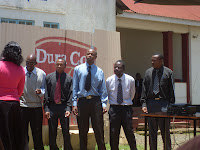Arrived at the matatu station this morning. I asked the men there how to get to Khayega, which was a mistake, because of course everyone wants the business. The man I asked said I could take his friends' matatu and change at Kapsabet for another matatu going to Chaveli, and then Khayega, which is where I'd arranged to meet Michael (the other PULSE volunteer from Kisumu working for the OGRA foundation.) He was driving, and the plan was to meet in Khayega, and travel to the forest from there. Anyway, the man at the matatu station gave me his number and said to call if I had any problems. I call Michael from inside the matatu, and we agree to meet in Chaveli instead. The matatu takes some time to fill up, but once full, we’re off. Peter (the missionary sat next to me) overhears my conversation and starts chatting to me. I'm skeptical at first, and weary of how much I tell him, but he seems quite genuine, and i'm enjoying the chat. He's going to preach at a boys school on excellence this morning. Just before getting off, he says if I need help at anytime, here's his number.
We pass the 5km sign for Kapsabet, and the matatu stops. The locals are talking anxiously in Swahili, and i'm not understanding a word. Suddenly everyone starts putting on their seat belts, so I do the same. We continue a bit further down the road, and the conductor dismounts. He runs up the road, and then back, and says something in Swahili, and everyone gets off the matatu. It seems that the traffic police are there, and the matatu doesn't have the appropriate license for which they could go to jail. The conductor tells me to follow everyone else. So I do as i'm told. It's here that I meet my new friend Robert. He's from the Kalenjin tribe, and an athlete, studying car mechanics at the University in Kapsebet, wanting to get a scholarship for his running to study in France. Robert showed me the way to Kapsebet. He explained he was an orphan. I was expecting that I'd have to give him some money for showing me the way, but at no point on the journey did he ask for or expect me to give him money. I wish I wasn’t always so skeptical, I just can't help it. Instead, Robert gave me his number, and said to call him anytime, and gave me God's blessing. What a nice guy. I called Michael en-route to explain what had happened, and he said he'd drive to Kapsabet instead.
I found a hotel called Elten. Apparently, this is the tallest building in Kapsabet, so Michael should find me easily! Here, I met Dan, who seemed anxious to talk to me. I thought he was a worker at the hotel, as he was lingering in the hotel entrance, but later turns out he is friends with the owner. Michael turns up about 15minutes later in a four-wheel drive.
It was great comparing stories and experiences, it sounds like he’s having a completely different experience to me! I guess one of the reasons being he is one of 6 PULSE volunteers in Kisumu, and I am on my own.
We got a guide at the forest for 500KS (~3.50 GBP) each, and then 600KS (~4.00 GBP) for entry into the forest. We went via the Southern part (the Isecheno area). Kakamega forest is amazingly beautiful.
Saw lots of butterflies, monkey's, and safari ants! There were also medicinal plants there for various ailments, including healing colds. We ended in the butterfly house. On the way home, we saw baboons on the road, which was pretty cool. I wound up the window to stop them stealing our food!
 |
| Can you spot the black & white tailed monkey? |
I caught a matatu from Kapsabet. It took some time for it to fill up though. Street sellers were trying to sell me nuts, fruits, maps, posters and various other paraphernalia. Grace made a fruit salad with the avocados that Evelyn had given me on Friday, which we shared. The fruits are so juicy and tasty here compared to back home. I worked on statistics lesson for tomorrow, then skyped home. Was nice to see and chat to everyone. I feel so distant from them all.




















































